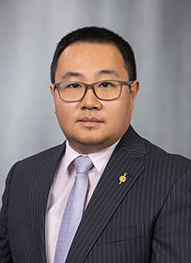Meng (Peter) Zhang
Associate Professor
 Steve Hsu Keystone Research Scholar
Steve Hsu Keystone Research Scholar
Contact information
2075 Rathbone Hall
meng@k-state.edu
Education
- Ph.D., Industrial Engineering, Kansas State University, 2014
- M.S., Mechanical Engineering, Dalian University of Technology, 2009
Professional experience
Dr. Meng Zhang received a bachelor’s degree in mechanical engineering from Dalian University of Technology, China, in 2009. In the same year, he joined the graduate program in the department of industrial and manufacturing systems engineering at Kansas State University and received his doctorate degree in industrial engineering in 2014. He remained at K-State and served as a postdoc fellow. In January 2015, Zhang joined the faculty as a visiting assistant professor with both teaching and research responsibilities. He served as an assistant professor at his alma mater from 2016 to 2023, and was promoted to associate professor in fall 2023.
Research
Zhang's research is centered on advanced manufacturing. He is specifically interested in renewable energy manufacturing, ultrasonic vibration-assisted processes and additive manufacturing for health. His current research topics include: biomass preprocessing (pelleting and size reduction), relationships between cellulosic biomass structural features and enzymatic hydrolysis sugar yield, rotary ultrasonic machining of high performance materials, fiber reinforced additive manufacturing, and 3D bioprinting of living tissues for wound healing. Zhang’s research group have greatly contributed to the fundamental understanding and process optimization and for more efficient and economic converting the biomass to biofuels. Zhang for the first time separated the confounding effects of particle size and crystallinity, making it possible to study the effects of particle size and crystallinity on sugar yield independently. Zhang’s findings provided the first-ever evidence that the relationships between particle size and sugar yield can be different when two different sugar yield definitions are used. He also demonstrated that woody biomass size reduction orientation has significant impact on the sugar yield of produced particles.
Academic highlights
Zhang's research discoveries have led to 18 publications in peer-reviewed journals and 25 conference papers. He also edited one textbook and authored two book chapters. As the lead author, Zhang’s book chapter “Ultrasonic vibration-assisted pelleting of cellulosic biomass for biofuel production” contributed to the Springer book series “Biofuels and Biorefineries” has almost 1,000 downloads since published in 2015. Zhang has served as proposal reviewer for NSF and USDA and as reviewer for more than 20 peer-reviewed journals. His research and education activities in renewable energy manufacturing have been supported by three awards from the National Science Foundation.